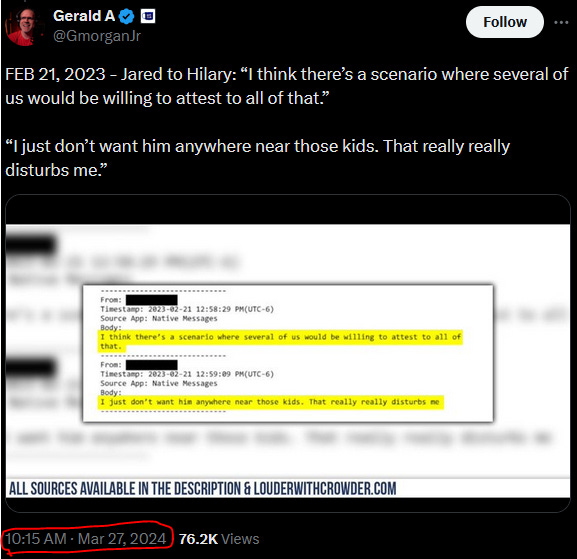Did Crowder Defame Himself and Blame Not-Gay-Jared For It?
It would seem Crowder published the information he's suing about.
The host of Louder with Crowder (LWC), Steven Crowder, has been going through a very tumultuous divorce that he’s chosen to make public.
We’ve been covering his trial since day one. You can find our original reporting here:
Steven Crowder's Divorce Trial
Steven Crowder is a long time political commentator. Well known for his “Change My Mind Series” where he sets up a table and debates with college students and others about politics. Crowder was a pioneer in the format of college campus debates, and also a long-time Texas resident. Crowder, who has a questionably lean voting history, has been relatively …
Crowder, it seems, has decided to file multiple suits against individuals close to his ex-wife, including former LWC staffer Jared Mitello (Not Gay Jared).
According to a lawsuit filed on 5/24/24, Crowder is suing his former staffer seemingly for defamation and extortion and seeking one million dollars in damages.
In the portion for defamation, the suit states that Jared Monroe “published false and disparaging statements about LWC.”
A statement being cited as being defamatory is a tweet from Monroe addressing a screenshot from text messages seemingly acquired through court discovery.
Based on publishing timestamps, it would seem that it was both Steven Crowder and his staff that published the text messages first before Monroe ever publicly addressed them.
It does seem odd to sue someone for defamation over something you first chose to publish publicly and on multiple platforms.
Greg Cox, an attorney based here in Texas, has an interesting post addressing the high burden associated with winning a defamation claim.
However, once you step into the political arena and become a public figure, you lose much of your ability to set the record straight via the judicial system. Your ability to win a defamation claim is next to impossible because you must prove that not only was the statement false but that it was made with “actual malice.”
That’s a high burden.
If you contend that you’re being sued based on or in response to exercising your right to free speech, right to petition, or right of association, you may file a motion to dismiss under the TCPA. And you get to do this before the expensive and intrusive discovery process begins.
And here’s the kicker: if the Judge indeed dismisses the lawsuit pursuant to your TCPA motion, the Judge then must order the plaintiff to pay your legal fees.
The Judge is also required to consider sanctions against the party that filed the lawsuit in the first place in order to deter them from filing similar lawsuits. (Sanctions are monetary penalties meant to penalize parties and attorneys and dissuade the filing of future similar suits.)










